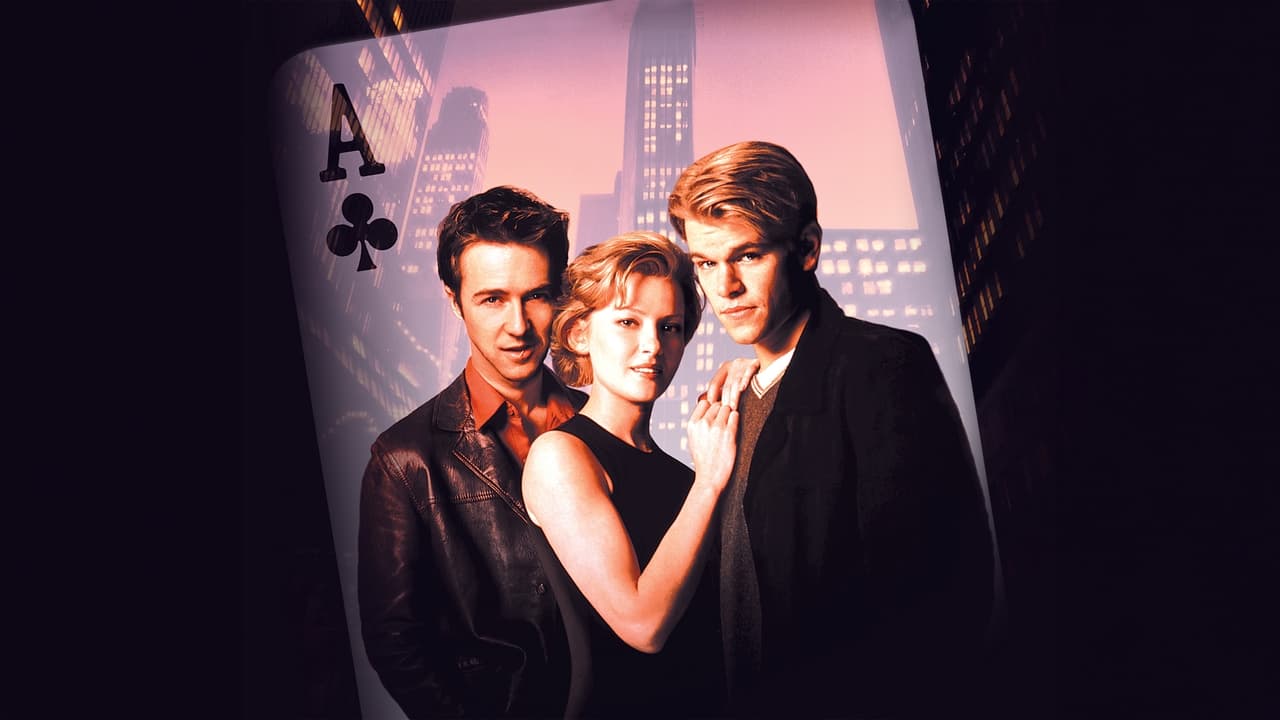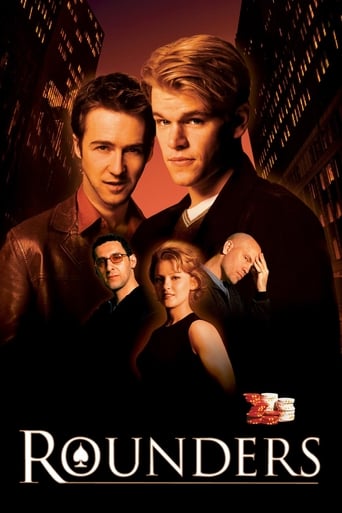a_chinn
"The game in question is no limit Texas hold'em. Minimum buy in twenty five thousand dollars a game like this doesn't come around often outside the casinos, the stakes attract rich flounders and they in turn attract the sharks. Each player is dealt two cards face down then five cards are dealt face up. These are known as community cards everyone can use to make the best five card hand. The key to the game is playing the man, not the cards. There's no other game in which fortunes can change so much from hand to hand. A brilliant player can get a strong hand, crack go on tilt and lose his mind along with every chip in front of him. This is why The World Series of Poker is decided on a no limit hold'em table. Pro's won't play no limit. They can't handle the swings but there are others, like Doyle Brunson, consider no limit the only pure game left, "Like Papa Wallenda said, 'Life is on the wire, the rest is just waiting.'"This is the audience's introduction to the underground gambling world of "Rounders." Director John Dahl was on a roll when he made this film. He'd previously directed three amazing film noir throwbacks with "Kill Me Again," "Red Rock West," and "The Last Seduction," each one better than the last (he did falter with one sci-fi throwback "Unforgettable," but it's still entertaining). Dahl reached a career high with "Rounders," which is the definitive gambling film. There are some great movies set in the gambling world, like "The Cooler," "The Good Thief" (a remake of "Bob Le Fambeur"), or "California Split," but those films were not so much about the game and the gambling subculture as was this film. "Rounders" tells the story of Mike, Matt Damon, who's putting himself through law school playing Texas hold 'em, much to the consternation of his girlfriend, Gretchen Mol, who gets him to swear off gambling after one particularly bad loss. That is until his old buddy Worm, a terrific scene stealing Edward Norton, gets released from prison and sucks Damon back into the world of illegal underground gambling. Norton quickly finds himself in trouble over old debts he owns and in danger from John Malcovich, in one of my favorite of his performances, which is saying something, as Teddy KGB, a Russian mob connected local loan shark and underground gambling parlor operator, who Mike makes the mistake of vouching for Worm's debt. The story of Mike trying to balance his straight life as a student and helping out his friend in the underground criminal gambling world is terrific, but it's the film's portrayal of this underground gambling subculture that's most interesting about the film. Besides doing a great job explaining the game itself and how the best players think about the game (there's on great little scene when Mike is rewatching an old VHS copy of the World Series of Poker and talking about Johnny Chan's play at the with a fellow rounder), the audience gets an insider look at how this secret world operates and the type of people who populate it, which ranges from skilled players like Mike who are willing to risk it all, to skilled cheaters like his friend Worm, to dangerous gangsters like Teddy KGB or his various thugs, or the workers at these gambling dens like the pretty Petra (the underused Famke Janssen), to "grinders" like John Turturro's Joey Knish, who Damon describes as, "a New York legend. He's been a "rounder", earning his living at cards since he was 19 years old." Knish is an older guy now, with a family and a responsibility, who plays poker a whole lot safer. At one point in the film, Damon chides Knish, saying, "You see all the angles, and you never have the fucking stones to play one." to which Knish strongly replies, "Stones? You little punk! I'm not playing for the thrill of fucking victory here! I owe rent, alimony, child support. I play for money. My kids eat. I got stones enough not to chase card actions of fucking pipe dreams of winning the world series on ESPN. But about the money I've got to turn my back. I've got to say no." There's great moments like this throughout the film, such as when all of the degenerate gambler characters are in an Atlantic City casino and work unsuspecting rubes who have the unfortunate luck to sit at their table. As Mike narrates:These two have no idea what they're about to walk into, down here to have a good time they figure, "why not give poker a try? after all how different could it be from the home games they've played their whole lives?" All the luck in the world isn't going to change things for these guys, they're simply over matched, we're not playing together but then again we're not playing against each other. They wear their "tells" like signs around their necks, facial tics, nervous fingers the hand over the mouth, the way a cigarette is smoked, little unconscious gestures that reveal the cards in their hands. We catch everything if a fish acts strong he's bluffing, if he acts weak his got a hand, it's that simple. It's like the nature channel... you don't see Piranhas eating themselves, do you?There's another great little scene where Mike reads a table of his law school professors within seconds, amazing the group by saying "You were lookin' for that third three, but you forgot that Professor Green folded on Fourth Street and now you're representing that you have it. The DA made his two pair, but he knows they're no good. Judge Kaplan was trying to squeeze out a diamond flush but he came up short and Mr. Eisen is futilely hoping that his queens are going to stand up. So like I said, the Dean's bet is $20." Later, Professor Petrovsky, the great Martin Landau asks Mike how he did it. Professor Petrovsky: I know a magician doesn't reveal his secrets.
Mike McDermott: I'm not a magician.
Professor Petrovsky: If it wasn't "magic", how did you know what everyone held?
Mike McDermott: It's a combination of things: I was watching when the cards came out, that's just an old habit with me, it's like breathing
Professor Petrovsky: Watch the cards?
Mike McDermott: I watch the cards but I also watch the player react to the cards. That's how I knew the DA made his two pair and judge Kaplan missed the flush, I was watching their eyes when they checked their river cards, their faces tell you everything.
Professor Petrovsky: (Confused) You watch the man? I never knew you had to calculate so much in cards.
Mike McDermott: Here's some advice, just play premium hands, you only start with jacks or better if its good enough to call you've also got to be in there raising, tight but aggressive and I do mean aggressive, you've got to think of it as a war.
Professor Petrovsky: You're officially never invited to our game again.
Mike McDermott: I don't blame you, put a guy like me in that game, cards don't even matter I'll play it blind.Mike's voice over narration is filled with great tidbits that reek of authenticity (although I admittedly don't know all that much about gambling, but it sounded real to me), such as:In "Confessions of a Winning Poker Player," Jack King said, "Few players recall big pots they have won, strange as it seems, but every player can remember with remarkable accuracy the outstanding tough beats of his career." It seems true to me, cause walking in here, I can hardly remember how I built my bankroll, but I can't stop thinking of how I lost it.Or You can shear a sheep many times, but skin him only once.OrIt's immoral to let a sucker keep his money.
Or even Mike's girlfriend gets in on it when finally breaking up with him and saying:Mike, I learned it from you. You always told me this was the rule. Rule number one: Throw away your cards the moment you know they can't win. Fold the fucking hand.The film is filled with beautifully terse dialogue such as this that borders on sounding almost as good as David Mamet (Mamet wrote his own film about con men and gambling, "House of Game," which everyone should watch). The film's smart script by David Levien and Brian Koppelman is a major element of the film's success, as are the film's many strong performance, led by Damon, Norton, and Malcovich, as well as strong supporting performances from Tuturro, Landau, Janssen, and Josh Mostel, Lenny Clarke, and Michael Rispoli as well. Also worth acknowledging is the director John Dahl, who brings a terrific sense of style to the film, creating a moody backroom setting that feels quite real and gives the audience the sense they are peeking behind the curtain to see something secret. Besides telling a great story about gambling, "Rounders" also works as a fascinating subculture film, meaning films that give you glimpse into a group of people who you previously never understood or knew existed. These types of films, even when the narrative is lacking can be fascinating. Some of the better examples of this type of film are Neo-Nazi's in "American History X" or 80s punks in "Suburbia" or heroine addicts in "Trainspotting" or even young wealthy priveleged intellectuals in Whit Stillman movies like "Metropolitan, "Barcelona, or "The Last Days of Disco"). So top off a fascinating subculture films, with great performances, a great script, superb direction, with moody photography, and a terrifically noirish score by Christopher Young, and you have a film that should rightfully be considered an American film classic.

